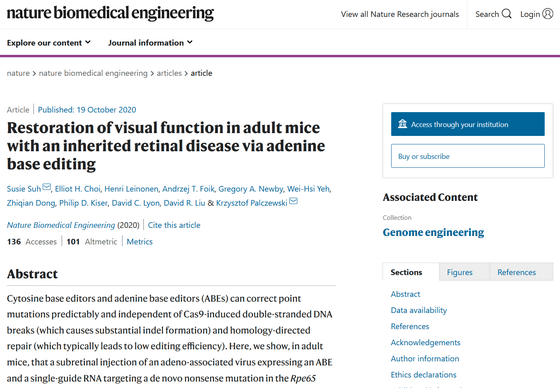Advance research to treat hereditary eye diseases with genome editing technology 'CRISPR', succeed in treating mice

Restoration of visual function in adult mice with an inherited retinal disease via adenine base editing | Nature Biomedical Engineering
https://www.nature.com/articles/s41551-020-00632-6

UCI-led study reveals significant restoration of retinal and visual function following gene therapy | School of Medicine | University of California, Irvine
https://www.som.uci.edu/news_releases/Retinal-visual-function-restored-with-gene-therapy.asp
Vision is one of the most important senses of the five senses, but congenital genetic mutations can cause severe vision loss and blindness. Eye diseases caused by genetic mutations such as retinitis pigmentosa and Leber congenital melanosis are called ' Inherited retinal diseases (IRD)' and are known for the lack of effective treatments. I have.
In response to these IRDs, a research team at the University of California, Irvine focused on a new technology, ' Base Editing, ' which applies CRISPR-Cas9. CRISPR-Cas9 is a technology that edits the genome by cutting double strands of DNA, while single nucleotide editing is a technology that edits the genome without breaking the DNA strand using the DNA repair mechanism of the organism.

The research team injected a single-base adenine- edited virus under the retina into mice in which the 'RPE65 gene' contained in about 250 IRD-related genes was mutated to suppress nonsense mutations . As a result, he reported that the retinal and visual abnormalities caused by the mutation in the RPE65 gene were recovered.
'The treated mice are now able to visually identify direction, distance, contrast, spatial and temporal frequency,' the research team said. 'The results of this study will be a major step towards developing a treatment for IRD,' he said.
Related Posts:
in Science, Posted by darkhorse_log







